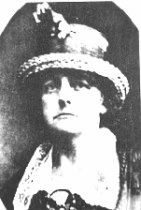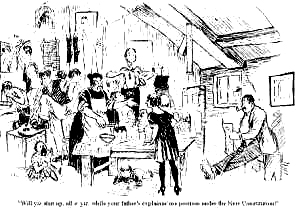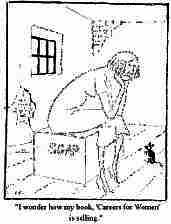Background
|
1923 The Cumann na nGaedheal party were in government.
1927 Male ratepayers could be compelled to sit on juries but female ratepayers would have to apply to be included on a panel.
1932 The Fianna Fáil party were in government. Female national teachers and civil servants lost their jobs on marriage.
1935 The Minister for Industry and Commerce could limit the number of women working in any industry. The government prohibited the advertisement, importation and sale of contraceptives.
1937 Bunreacht na hÉireann: the Constitution of Ireland included several articles concerning women which gave cause for concern.
|
Those who struggled for many years for women's suffrage must have been
dismayed when so few women were nominated or elected to political office. One
woman senator, the Countess of Desart, had actually been an opponent of women's
suffrage.
However, a few women made very effective interventions on women's issues,
especially Jennie
Wyse Power who was a member of the Senate from 1922 to 1936. |
 |
|
Of all the women elected to the Seanad between 1922 and 1937, Jennie Wyse Power was to emerge as the most persistent and determined champion of equal rights for women. This Senator, who was among the thirty Government nominees to the Seanad in 1922, was considered to be representative of the nationalist tradition, as one who had been active in the Ladies' Land League, the Gaelic League, Sinn Féin and Cumann na mBan. When dealing with issues such as homeless children, infant mortality and the poor, her contribution is significant, in that the voice of Jennie Wyse Power was regularly the only one arguing on behalf of such groups in the Seanad.
Mary Clancy, 'Aspects of women's contribution to the Oireachtas debate in the Irish Free State, 1922-1937' in Maria Luddy & Cliona Murphy (eds.), Women Surviving, 1990, p. 209.
|
Jennie Wyse Power helped defeat the government's attempt in 1925 to prohibit women from the higher grades in the Civil Service. She opposed the exclusion of women from jury service in 1927, 'entirely influenced by the fact that if this Bill becomes law, the civic spirit that is developing in women' would be damaged. She condemned the Fianna Fáil scheme for protecting male employment by restricting the number of women employed in industry in 1935 and reminded the Seanad of the hopes of young girls who lost their employment following the 1916 Rising and who had hoped that 'when our own men are in power, we shall have equal rights'. They might have been naïve, but, she said, 'it was part of their faith'.
Several women's organisations were active on these and other women's issues.
- The Irish Women Citizens and Local Government Association (IWCLGA) was a small organisation but included several prominent and active women like Jennie Wyse Power.
- The National University Women Graduates' Association (NUWGA) set up in 1908, campaigned vigorously on women's issues.
- The National Council of Women (NCW) was founded in 1924 to promote co-operation between women's organisations.
- The Joint Committee of Women's Societies and Social Workers (JCWSSW) was set up in 1935 by nine voluntary women's organisations to co-ordinate campaigns on women's issues.
- The Irish Women's Workers' Union (IWWU) was founded in 1911 as a trade union representing women workers.
These organisations frequently objected to restrictions on the lives of women and children and lobbied for improvements. De Valera agreed to meet delegations from women's organisations and to listen to their concerns that certain articles in the draft Constitution of Ireland could be used to further restrict women. However, in spite of their strong objections, he insisted on inserting the following articles:
|
41.2.1 In particular, the State recognises that by her life within the home, woman gives to the State a support without which the common good cannot be achieved.
41.2.2 The State shall, therefore, endeavour to ensure that mothers shall not be obliged by economic necessity to engage in labour to the neglect of their duties in the home.
45.4.2 The State shall endeavour to ensure that the strength and health of workers, men and women, and the tender age of children shall not be abused and that citizens shall not be forced by economic necessity to enter avocations unsuited to their sex, age or strength.
|
Nevertheless, the delegations did meet with some success. De Valera agreed to delete the phrase 'inadequate strength of women' from Article 45.4.2 and he inserted phrases in Articles 9 and 16 to ensure equal rights for women in relation to citizenship, voting and membership of the Dáil and Seanad.

'Will yiz shut up, all o'yiz, while your father's explainin' me position under the New Constitution'
Cartoon. Dublin Opinion, 1937.
The participation of women in politics continued to be a problem, however. The Women's Social and Political League was founded in 1937 to support the election of independent women candidates to the Dáil but it failed to gain sufficient funding and widespread support. Hanna Sheehy Skeffington, a stalwart campaigner on suffrage and national issues, stood as an independent candidate for a Dublin constituency in 1943, but was defeated and lost her deposit, while three other independent women candidates were also badly defeated.
A successful outcome of the Laundry Workers' Strike organised by the IWWU in 1945 ensured that all workers became entitled to an annual holiday of two weeks.
The ban on married women in National School teaching imposed in 1932 was lifted in 1958, though teachers in convent secondary schools could lose their jobs on marriage from 1957. The ban on married women in the Civil Service was not lifted until 1973.

"I wonder how my book 'Careers for Women' is selling"
Cartoon. Dublin Opinion.
Questions
- Jennie Wyse Power was a member of the ________ from _____ to ______.
- Women national teachers lost their jobs on _______ from ______ to ______ and women civil servants from ______ to _____.
- Write a short paragraph about Jennie Wyse Power's contributions on women's issues in the Seanad.
- Why were women's organisations so concerned at certain articles in Bunreacht na hÉireann: the Constitution of Ireland, 1937?
- Discuss any two of the issues implied in the Dublin Opinion cartoons.
- What historic outcome arose from the Laundry Workers' Strike in 1945?
- Did you find any information in this section surprising? Give reasons for your answer.
Activities
- Research and discuss the career of Jennie Wyse Power.
- Research any of the women's organisations mentioned above.
- Which, if any, of the above organisations would you have joined if you had been a woman in Ireland during the years 1930-1950? Give reasons for your answer.
- Compose a letter stating your opinions about Bunreacht na hÉireann: the Constitution of Ireland, 1937.
- Research a selection of the implications of Bunreacht na hÉireann: the Constitution of Ireland, 1937 for women.
- Research Bunreacht na hÉireann: the Constitution of Ireland, 1937 in the context of attitudes to women in Ireland and Europe in the 1930s.


